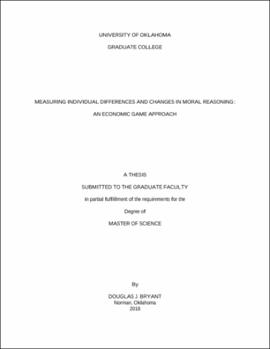| dc.contributor.advisor | Fuenzalida, Luz-Eugenia | |
| dc.contributor.author | Bryant, Douglas | |
| dc.date.accessioned | 2018-10-11T20:50:10Z | |
| dc.date.available | 2018-10-11T20:50:10Z | |
| dc.date.issued | 2018 | |
| dc.identifier.uri | https://hdl.handle.net/11244/301821 | |
| dc.description.abstract | Motivated reasoning bias and its manifestation in confirmation bias make it unlikely that people will change their minds on matters for which their positions are expressions of their own or their group’s identity. Moral scenarios serve as a useful proxy for evaluating motivated reasoning because moral positions often comprise major components of individual and group identity. While many interventions to overcome these cognitive deficits have been tried, they have had only limited success and suffer from the problem of failure in domain transfer. Previous research has identified a subset of individuals who demonstrate a greater than average immunity to cognitive biases. However, characteristics associated with this reduction in susceptibility have yet to be identified. The goal of the present study was two-fold: 1) to validate an economic game approach for measuring changes in moral reasoning and 2) to examine cognitive behavioral covariates, namely, openminded thinking and moral foundations, associated with performance. This approach used an economic game in which participants spent money to reward or punish scenario actors for their moral actions. The scenarios were divided into six epochs of increasing/new information. Following each epoch, participants rendered a judgment based on the information available to them at the time, and changes from previous judgments were measured. Results revealed that thinking in monetary terms significantly changed moral judgments. Open-mindedness was highly correlated with moral foundations and political identity. Each of these predicted reversals in judgment, though in surprising directions. The results suggest that participants who are politically conservative and less openminded reverse their positions more often than more open-minded, politically liberal participants. | en_US |
| dc.language | en_US | en_US |
| dc.subject | Rationality | en_US |
| dc.subject | Bias | en_US |
| dc.subject | Moral | en_US |
| dc.subject | Economic Game | en_US |
| dc.title | Measuring Individual Differences and Changes in Moral Reasoning: An Economic Game Approach | en_US |
| dc.contributor.committeeMember | Vincent, Andrea | |
| dc.contributor.committeeMember | Buckley, Mike | |
| dc.contributor.committeeMember | Freeman, Erin | |
| dc.date.manuscript | 2018-10-11 | |
| dc.thesis.degree | Master of Science | en_US |
| ou.group | College of Arts and Sciences::Department of Psychology | en_US |
